During August I’ve been repeating some Posts from years past – with a few improvements. (I’ve never been able to leave well enough alone.) This one was originally published on October 6, 2017, telling about my trip to Patmos in September 2007. And as I write this, it’s August 30, 2024. Seventeen years ago – how can that be?
So… let’s go to Greece again!
2007 was a great trip – and in these days of super-hyperbole I don’t say that casually. Khouria Dianna and I were together for a happy week of vacation on Crete. (One of these times I’ll have to tell you more about Crete.) Then she flew home for her niece’s college graduation in Oregon, and I took a Blue Star ferry to the island of Patmos.
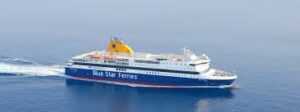
Patmos
… the island where the Apostle John the Evangelist and Theologian spent some years in enforced exile, about the year 90, and wrote his Revelation.
Why did I want to go to Patmos? Because a few years ago Mike Huber, a man from our congregation, gave me a book Patmos, A Place of Healing for the Soul by Peter France, an Englishman, a skeptic, but something about Patmos had brought him to the Faith. He was baptized there by Bishop Kallistos Ware. Ever since I read it I had wanted to see the place for myself.
Courtesy of Robert Polasek “A Touch of Greece”
Patmos is a lovely peaceful small island on the eastern frontier of Greece. On a clear day you can see Turkey *, the coast of Asia.
- There are many negative things one can say about Turkey, but I could pick up classical radio music from there, which is more than you can do in Milwaukee, and I spent my last evening on Patmos packing and listening to Nat King Cole from Turkey!
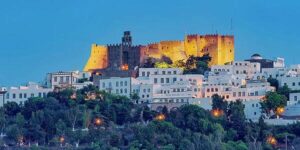
As the ship approaches by night, the Monastery of Saint John is spectacular, hanging all alight atop the island like a fortress – which once indeed it was.
Though Greece is about 98% Orthodox, a good many don’t practice it much except on Pascha and to light a candle from time to time. Patmos, however, is a place where Orthodoxy is very much part of peoples’ lives.
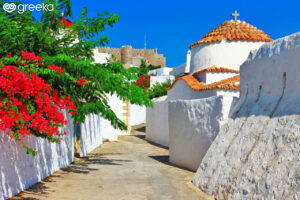
With a population of about 2500 (less than a quarter the number of people in my hometown, Cedarburg), Patmos has about 500 Orthodox churches and chapels. The small local military base has an Orthodox chapel. The exclusive resort Porto Scoutari has an Orthodox chapel. Most of these little churches have services from time to time – but when? where? Usually when the bells ring, you look around and can see six or eight chapels – but which one is it? By the time you find out it’s usually too late. On Sunday after Divine Liturgy I decided to drive about and visit every church and chapel I saw. (Well, some I decided not to climb up to.) Most were open and had candles burning. They were being used.
And for those who say Orthodoxy is not evangelistic enough, on the waterfront on Patmos is the Orthodox Information and Cultural Center with good video displays in many languages. At the entrance is an excellent presentation on Orthodox environmentalism, a major concern of Ecumenical Patriarch Bartholomew, as it should be for all of us. (How did this ever become politicized and controversial? Fifty years ago it was not.)

Little Patmos has two large monasteries – Evangelismos women’s monastery on the west coast with about 45 nuns, where I went for Sunday Orthros and Divine Liturgy, and Saint John’s Monastery with about 25 monks and a magnificent church and museum. There is another small women’s monastery, and there are hermits back in the hills who do not give out their addresses for the obvious reason. I try to imagine all this over on the east side of Cedarburg, which has about the same population!
Everywhere you look there goes a monk driving a pickup truck or a priest walking by. One weekday morning I saw a priest and his flock of about twenty leaving a church after Liturgy, heading down the street, no doubt to go to the kafenion, the coffee shop – just as we do at home. Orthodoxy is so much the same wherever you go. As I came into Sunday Orthros (Matins) I thought: Why is the priest censing at the wrong place? But he wasn’t. They had started earlier than I thought, and it was the usual censing at the Song of Mary, just as we do. Some of the music was different, and it was in Greek of course; otherwise it was our Matins and Liturgy.
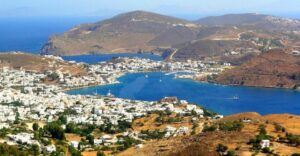
There is a sweetness, a gentleness, a grace that pervades Patmos. You can feel it – especially after the day-time tourists board their ships and vanish. Perhaps also it’s because Patmos has no airport. But there’s more to it than that.
I think it’s the Church. As I say, the Orthodox Church is integral to the life of Patmos. But has this turned the people into a bunch of hard-nosed religious fanatics? Not at all. The non-Orthodox lady who ran my hotel (a German who moved to Patmos) wrote in her book about the island: “While the Greek Orthodox Church plays an important but not all-dominating role in the life of its adherents, it disapproves of any religious fanaticism – its views are far too human.” Yes! Orthodoxy is humane. In most places. *
- August 30, 2024. I feel compelled to add these italics, in light of the inhumane Russian invasion of Ukraine, with the full support of the Russian Orthodox Church.
Also, the book says there is no reported thievery on Patmos (except for construction materials…no explanation given!), no reported violent crime, and the last murders took place during World War II, about eighty years ago, committed by German Nazis not by Patmians. There is no great wealth on the island, no great poverty, and she wrote that it is considered tasteless for those who have money to show it ostentatiously. (Take me back to Patmos…)
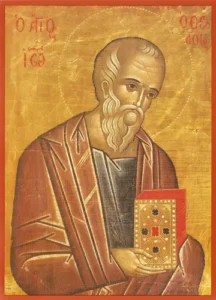
One evening walking on a back street I came on the Byzantine Tekne (arts, crafts) store with wonderful things, including many original icons. One icon of John the Apostle, Saint John the Theologian, Ο Άγιος Ιωάννης ο Θεολόγος as he is on the icons, caught my eye: it wasn’t a perfect icon, and it turned out to be a paste up copy. In that respect I was “ripped off” as they say. But I loved it. It showed John as an old man. His face was filled with wisdom and knowledge and pain – driven out of his homeland, then out of his new hometown Ephesus and exiled to Patmos. But his face was above all filled with love. They say that in his great old age they would carry John to church, and he would say only, “Little children, love one another.” I asked the price, gasped, left and thought about it, came back, left and thought about it some more – and finally decided if I didn’t buy it I would always regret it.
I had the money, thanks to gifts (not “fees” by the way; we don’t charge for sacraments and blessings) which my parishioners had given me for house blessings and weddings and the like – so I bought it and gave it to our Saint Nicholas Church in memory of our dear Deacon John McQuide who knew and loved his patron Saint John so very much. In personality Deacon John was like his patron. Jesus nicknamed John and his brother James “sons of thunder” (“boanerges”), but both also were filled with love. Deacon John, dear friend Jack: May your memory be eternal.
The young man who ran the shop made incense for most of the churches on Patmos (he must be rich!) and for monasteries on Mount Athos. As usual I was traveling incognito (so people would neither fawn all over me nor run from me) but I obviously was showing an unnatural interest in incense, and he asked, “Are you a priest?” I said, “Yes.” So he gave me the names of his family to be remembered at Divine Liturgy, and we prayed the following Sunday at our Liturgy at Saint Nicholas for “Anastasia, Anastasios, Vasiliki, Zoe, Nikolaos and Vasilis”. God bless them, whoever they are.
 I also brought back three kilos of that elegant incense. The one I loved most is made from a gardenia (“phouses”) which grows only on Patmos. I also brought the latest from Mount Athos – elasticized prayer ropes, one size fits all! The Orthodox Church has finally entered the elastic age.
I also brought back three kilos of that elegant incense. The one I loved most is made from a gardenia (“phouses”) which grows only on Patmos. I also brought the latest from Mount Athos – elasticized prayer ropes, one size fits all! The Orthodox Church has finally entered the elastic age.
Next Week: Part Two – 1) What I discovered reading John’s Gospel, Epistles and Revelation on Patmos. 2) Saint Nektarios does it again, on Patmos!
Appendix: The Value of Travel
 In 1787 Thomas Jefferson wrote: “Traveling makes men wiser, but less happy. When men of sober age travel, they gather knowledge, which they may apply usefully for their country, but they are subject ever after to recollections mixed with regret—their affections are weakened by being extended over more objects, and they learn new habits which cannot be gratified when they return home.”
In 1787 Thomas Jefferson wrote: “Traveling makes men wiser, but less happy. When men of sober age travel, they gather knowledge, which they may apply usefully for their country, but they are subject ever after to recollections mixed with regret—their affections are weakened by being extended over more objects, and they learn new habits which cannot be gratified when they return home.”
But, as “less happy” and unsettled as it sometimes has made me, still I loved to travel, and I believe in the value of travel. My wife and I chose not to live in a big house or to drive a BMW, but rather to travel.
Read the New Testament: see how many early Christians were forever coming and going. “The Lord has made of one blood all nations of men to dwell on the face of the earth.” Acts 17:26 By traveling we see other kinds of people whom God has made, other ways of doing things.
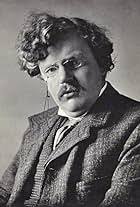 G.K. Chesterton wrote: “The whole object of travel is not to set foot on foreign land; it is at last to set foot on one’s own country as a foreign land.” Through my travels I’ve learned to appreciate America more. Christians are free here. Christianity is still alive here, and Orthodoxy is finally making itself accessible to Americans. Despite our current political nastiness, in real life so many Americans are good and kind and generous. America has provided a home and a refuge for “the tired, the poor”, those “yearning to breathe free” and has integrated them well into our society * – my own ancestors not so long ago and yours, and so many more today – and I pray God that we continue to do so. Europe, where their national cultures have long been “unitive”, is having a hard time dealing with immigrants.
G.K. Chesterton wrote: “The whole object of travel is not to set foot on foreign land; it is at last to set foot on one’s own country as a foreign land.” Through my travels I’ve learned to appreciate America more. Christians are free here. Christianity is still alive here, and Orthodoxy is finally making itself accessible to Americans. Despite our current political nastiness, in real life so many Americans are good and kind and generous. America has provided a home and a refuge for “the tired, the poor”, those “yearning to breathe free” and has integrated them well into our society * – my own ancestors not so long ago and yours, and so many more today – and I pray God that we continue to do so. Europe, where their national cultures have long been “unitive”, is having a hard time dealing with immigrants.
- August 28, 2024: I wrote the preceding having no idea that words like that would be so controversial seventeen years later.
But that doesn’t mean we know it all. I wish Americans traveled overseas more. I heard few American accents in Europe. We are only one small part of God’s world. I have come home wishing we Americans were more open to what we could learn from others, especially from some of the older cultures of the world. As we travel and watch and listen to others and learn from them, we discover things we would never know otherwise.
For one thing, in 2007 I discovered that Barney the Dinosaur (is he still around?) can speak Greek! with the same dippy voice he has here.
But to be serious, travel makes us ask questions and think and grow, not just take what we are and how we do it for granted.
Regarding Christianity: What you’ve heard is true: In Western Europe the practice of religion is nearly dead. Here, in my very limited experience is what I saw:
The great cathedrals are more like museums, than places of worship. In Britain, single candles are lighted beside the coffins of Saint Dunstan, Saint Alban, Saint David of Wales, but nobody pays any attention. Hardly anybody is around. In the city center of Granada, Spain, on Sunday morning we could not find one church open. However, this changed as we went south and east. Saint Peter’s Basilica in Rome was so holy it took my breath away , and people were praying and worshiping. At San Nikola Basilica in Bari, Italy, the place was full for 9 a.m. Mass, and again at 11 a.m., while at the same time down in the crypt where Saint Nicholas’ body lies, an Orthodox Divine Liturgy was being celebrated. They say that in Greece, many have fallen away from practice of the Faith. However, in my limited experience, visiting maybe twenty Liturgies in parish churches, all except one have been filled – some to overflowing.
While I’m at it, let me touch on other matters. Everywhere we visited in Europe has:
1 Health care for all. (Get sick while you’re in France attending the Olympics and you’re covered, no charge.)
2 Extensive paid maternity leave.
3 Good public transportation (rail/bus) into all corners of their country, like we used to have here when I was young. Oh, the trains! (Even Indonesia has high speed rail now.) *
- I can’t resist including this video. I have loved trains since I was a boy. (It’s a longstanding family male weakness.) Don’t watch it if you get dizzy easily. We’re talking over 200 mph here. And good for the environment. And smooth, Oh, poor Amtrak.
4 Safe streets almost everywhere in the cities. I wouldn’t have believed it if we hadn’t walked it.
Some castigate this as “Socialism”. Well-run humane society, I call it.
So I have seen the world – well, a few parts of it. And I am grateful. For “the Spirit of the Lord has filled the whole world, and all things have knowledge of the voice” Wisdom of Solomon 1:7, and I have wanted to see what He has been up to.
It’s painful to say it, but my long distance traveling days are over now. Nevertheless I’m still learning as I ponder all I have seen and heard.
Week after Next: Many Things – Articles, videos and thoughts, none of which are large enough to make up a full Post